When you look for couples therapy, it is important to find someone who understands both of you. Many couples feel stuck for a long time before they ask for help. Only about 6% of couples get professional help, but almost 99% say it helps when they find the right therapist. Look at these numbers:
Metric | Percentage |
|---|---|
Couples reporting a positive impact | 99% |
Couples saying therapy is worth the investment | 94% |
Couples reporting a high or very high impact | 76% |
Take time to talk with your partner about what you both want and need. You should have a therapist who is right for your relationship.
Key Takeaways
Talk with your partner about what you both want. Share what is important to you before you look for a therapist. – Use good websites and trusted groups to find couples therapists near you. – Look for therapists who have the right papers and special training in couples therapy like EFT or the Gottman Method. – Pick a therapist who talks in a way that makes you both feel safe. You should feel respected and understood. – Tell the truth during therapy. Be ready to try a new therapist if this one does not work for you.
Define Your Needs
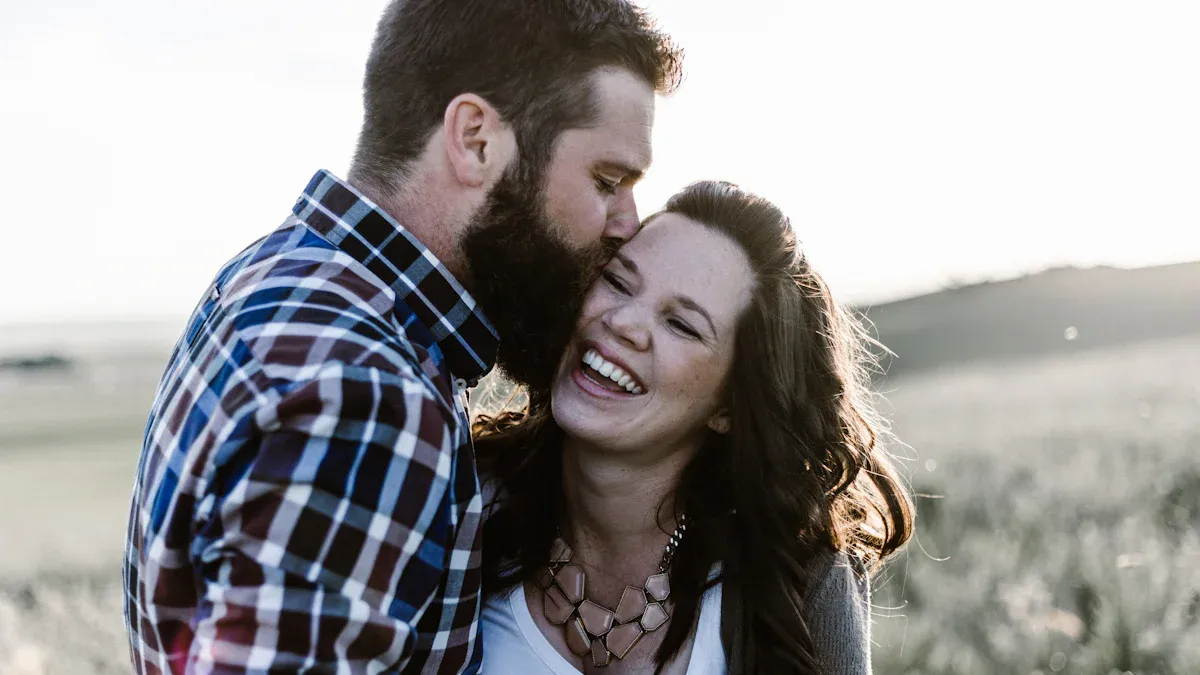
Relationship Goals
Talk with your partner before you look for a therapist. Decide what you both want to work on. Every couple has their own goals. Some goals are very common. Many couples want to talk better, trust each other more, or feel closer. You might want to check in every week or learn to solve fights in a good way. These goals help you go from feeling stuck to feeling close and understood.
Here’s a table that shows some common relationship goals and how you can focus on them as individuals or as a team:
Goal Category | Individual Focus | Shared Focus |
|---|---|---|
Communication | Practice active listening, use “I” statements | Weekly check-ins, conflict resolution |
Trust and Emotional Intimacy | Share feelings openly, set boundaries | Build deeper connection, express gratitude |
Physical and Sexual Intimacy | Show love regularly, share needs | Strengthen intimacy, talk about desires |
Family and Financial Plans | Think about readiness for kids, career goals | Align on parenting, budget together |
Personal and Shared Goals | Enjoy hobbies, self-care | Support each other’s goals, do activities together |
You can make short-term goals, like having a date night each week. You can also make long-term goals, like saving money for the future. When you know your goals, you can find a therapist who will help you reach them.
Preferences and Values
Your values and likes are important in therapy. You and your partner each have your own beliefs and family history. These things shape how you act with each other. For example, you may care about fairness, honesty, or being independent. Your partner may care about other things.
Therapy works best when you both feel respected and understood. If you talk about your values, your therapist will know what matters to you. This helps you build trust and solve hard problems. Sometimes, family traditions or past events change how you see things now. When you share these with your therapist, you can stop old habits and make new, better ways to connect.
Tip: Write down your top values and talk about them with your partner before your first session. This helps you both feel heard and gives you a strong start for working together.
Search for Couples Therapy
Where to Find Therapists
You can start looking for a couples therapist in many ways. The internet helps you find someone who matches what you need. You might use online lists, ask people you know, or check with professional groups. Here are some popular places to search:
Psychology Today: This is a big list of therapists. You can look for couples therapy near you.
GoodTherapy: This website has therapists who follow strong rules. You will find many couples therapists here.
Zencare: This site helps you find a therapist who fits your needs. It tries to make a good match.
TherapyDen: This list has many types of therapists. Some are new to the job.
Zocdoc: You can make appointments with couples therapists here.
BetterHelp: This network has many licensed therapists, including those for couples.
You can also look at professional groups. These groups make sure their members are trained and follow rules. Here is a table to show your choices:
Category | Name of Directory / Organization | Description |
|---|---|---|
General Therapist Directories | Psychology Today | One of the largest directories for psychotherapists, including couples therapy specialists. |
GoodTherapy | Popular directory with licensed therapists, including couples therapists, emphasizing ethical practice. | |
Zencare | Curated directory focusing on client-therapist matching, including couples therapy. | |
TherapyDen | Inclusive mental health directory with many online therapists, including couples therapists. | |
Zocdoc | Large platform for booking healthcare providers, including therapists specializing in couples therapy. | |
NetworkTherapy.com | Large directory covering various specialties and locations, including couples therapy. | |
Professional Associations | American Association for Marriage and Family Therapy (AAMFT) | Directory of licensed marriage and family therapists, a leading professional organization. |
American Counseling Association (ACA) | Counselor finder for professional counselors offering various mental health services. | |
American Mental Health Counselors Association (AMHCA) | Connects clients with licensed mental health counselors. | |
International Association of Marriage and Family Counselors (IAMFC) | Global directory of marriage and family therapists with expertise in family and relationship issues. | |
American Psychological Association (APA) | Locator for licensed psychologists with various specialties including therapy. | |
Association for Behavioral and Cognitive Therapies (ABCT) | Directory of therapists specializing in cognitive-behavioral therapy. | |
National Association of Social Workers (NASW) | Directory of social workers specializing in mental health therapy. | |
National Board for Certified Counselors (NBCC) | Directory of certified counselors meeting high professional standards. |
Tip: Ask people you trust if they know a good couples therapist. When someone you know gives a name, you might feel better about your choice.
Credentials to Look For
Not all therapists have the same kind of training. You want someone who knows how to help couples. Look for these important credentials:
LMFT (Licensed Marriage and Family Therapist): These therapists learn about couples and family problems.
LCSW (Licensed Clinical Social Worker) and LPC (Licensed Professional Counselor): These helpers often work with couples and have special degrees.
Master’s or Ph.D. in Psychology or Counseling: This means the therapist studied mental health for a long time.
Specialized Certifications: Some therapists learn special ways to help couples, like Emotionally Focused Therapy (EFT) or the Gottman Method. These ways help couples trust each other, talk better, and fix problems.
You might see that not every therapist knows EFT or the Gottman Method. There are less than 400 certified Gottman therapists in the country. Only a few have special training for affair recovery or advanced couples work. If you want a therapist with this training, you may need to look harder.
Here are some things to check when you read a therapist’s profile:
Are they allowed to work in your state?
Do they say couples therapy is one of their main services?
Do they talk about special training or certifications?
Are they part of groups like AAMFT?
A good therapist will respect your values and help you feel safe. You should feel okay asking about their work with couples like you. If you have special needs, like cultural or religious concerns, look for someone who understands your background.
Note: The right credentials show your therapist has the skills and experience to help you and your partner grow together.
Therapist Approach
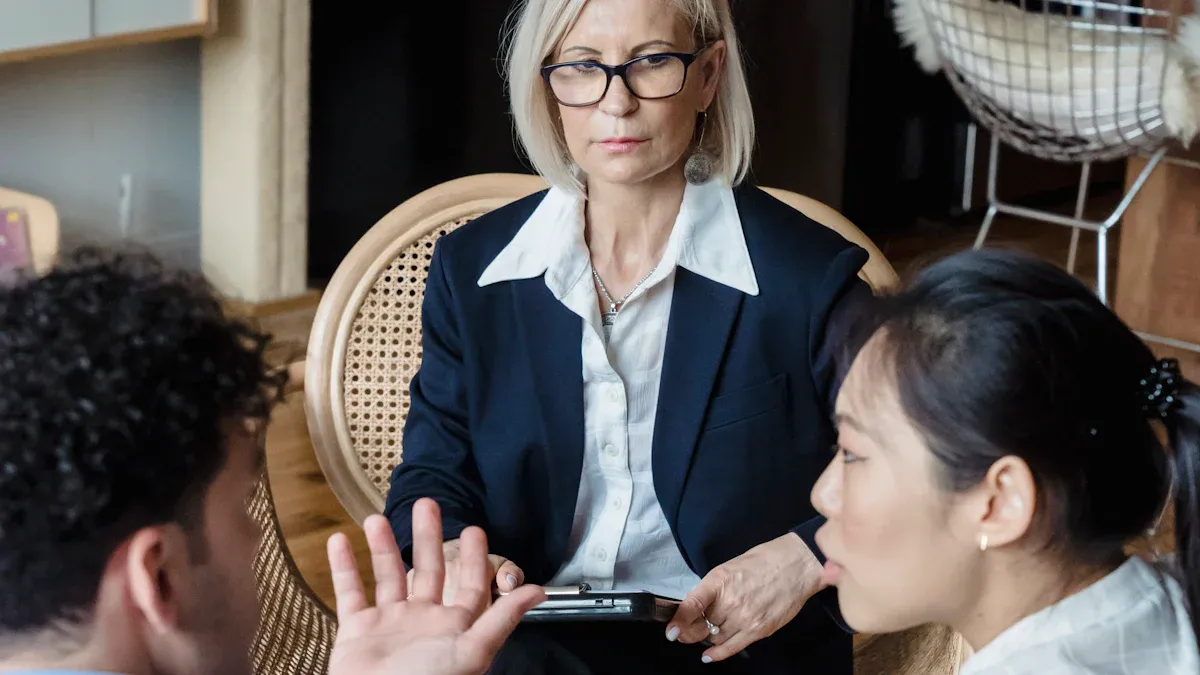
Therapy Methods
When you go to couples therapy, you will see that therapists use different ways to help. Two popular ways are Emotionally Focused Therapy (EFT) and Cognitive-Behavioral Couple Therapy (CBCT). Both can help, but they work in different ways.
EFT helps you and your partner understand feelings and needs. It helps you build a safe and strong bond. About 90% of couples who try EFT get much better. Most couples feel less stress and feel closer after this therapy. EFT helps you talk about feelings and learn new ways to support each other.
CBCT teaches you skills to fix problems and change negative thoughts. You learn how to talk better and handle hard times. This method uses steps and questions to help you see things differently.
Here is a chart that shows how these two ways compare:
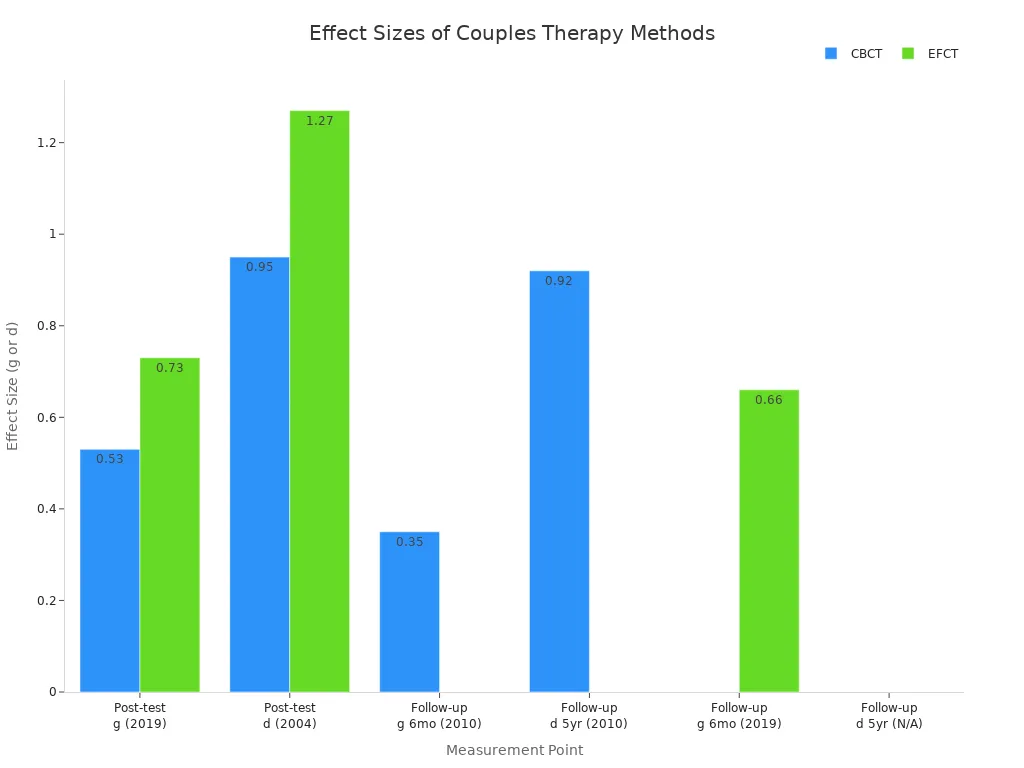
Both EFT and CBCT help most couples feel happier and closer. You can ask your therapist which way they use and how it can help your relationship.
Communication Style
A good therapist knows how to talk with you and your partner in a safe and open way. The way your therapist talks can help you trust them and work together.
Description | Purpose/Effect | |
|---|---|---|
Assertive Communication | Shares thoughts and feelings clearly and kindly | Helps you understand each other |
Active Listening | Pays close attention without interrupting | Builds trust and closeness |
Empathy | Understands your feelings | Makes you feel cared for |
Use of “I” Statements | Talks about their own feelings, not blaming | Lowers defensiveness |
Positive Language | Uses kind words | Encourages teamwork |
Non-verbal Communication | Uses eye contact and body language | Shows respect and attention |
Safe, Non-judgmental Space | Makes you feel comfortable sharing | Supports honesty |
Conflict Resolution Strategies | Helps you solve problems together | Stops fights from getting worse |
A therapist who listens, asks questions, and shows empathy helps you feel heard. They make a space where you can share your thoughts without worry. You and your partner will start to talk more and fix problems together. Over time, this builds trust and makes your relationship stronger.
Tip: If you feel safe and respected in therapy, you will make more progress in couples therapy.
Compatibility
Comfort Level
You and your partner should feel safe with your therapist. Feeling safe helps you talk about hard things. A good therapist makes sure you both feel respected. There are many ways to help you feel comfortable in couples therapy:
The room is private and quiet, with soft chairs and calm colors.
The therapist listens to you and does not judge.
There are clear rules about privacy and keeping secrets.
Sessions can change to fit what you both need.
The therapist listens closely and asks questions that help you share.
The space feels friendly, with sunlight, plants, and simple things.
The therapist’s qualities are important, too. You might feel better with someone who is your age or gender. Some couples want a therapist who understands their culture. This can make it easier to talk about private things. Studies show that a strong bond with your therapist helps you trust them. When you both feel safe, you can work together and make progress.
Practical Factors
You also need to think about some basic things before picking a therapist. These things can make it easier or harder to keep going to couples therapy. Here are some important things to think about:
How much each session costs: It can be $100 to $400, depending on where you live and the therapist’s experience.
Insurance: Some plans pay for therapy, but not all do. Therapists in your plan usually cost less, but you may have fewer choices.
Where the therapist is: Big cities like New York or Los Angeles cost more. Online therapy can be cheaper and easier to fit in your day.
When the therapist is free: Make sure their times work for you. Online sessions can give you more choices.
How you pay: Some therapists let you pay less if you need to, or take different ways to pay.
Here is a table that shows the average cost in different cities:
City | Couples Therapy Cost Range (USD) |
|---|---|
New York | $250 – $350 |
Los Angeles | $200 – $300 |
Chicago | $150 – $250 |
Dallas | $130 – $225 |
Denver | $125 – $200 |
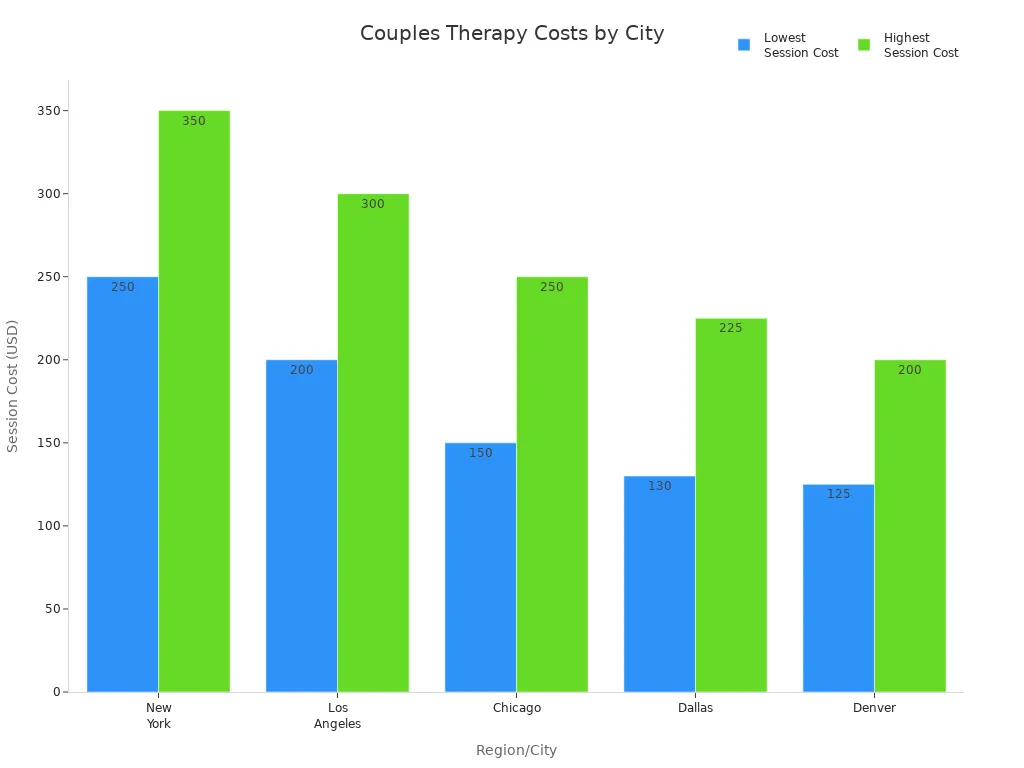
Tip: Ask if you can pay less or do sessions online if money is tight. Many therapists want to help you find a way that works.
When you and your partner feel safe and can handle these details, you are more likely to keep going. The right therapist helps you both feel heard and ready to grow together.
Assess Fit
Initial Sessions
Your first few sessions with a new therapist matter a lot. These meetings help you and your partner see if the therapist is a good match for your relationship. During these sessions, you can expect the therapist to ask questions about your goals, your history, and what you hope to change. This is your chance to share what feels important and to see if the therapist listens and understands you both.
Here are some things you can do in these early sessions:
Ask the therapist about their experience with couples like you.
Notice if you feel comfortable, respected, and safe to speak up.
Share your hopes and worries about therapy.
Pay attention to how the therapist explains their approach.
Make sure the therapist is open to your questions and feedback.
Tip: It is normal to feel nervous or even a little awkward at first. Many people feel a “vulnerability hangover” after sharing personal things. Be kind to yourself and talk about these feelings with your partner.
A good therapist will check in with you about how things are going. They may suggest weekly or biweekly sessions at first to help you build trust and make progress.
Feedback and Adjustment
Therapy works best when you and your partner give honest feedback. You can talk about what is helping and what is not. Many therapists use tools or short surveys to track your progress. These tools help you see changes and spot problems early.
Share your thoughts about each session.
Use any worksheets or resources your therapist gives you.
Ask for changes if something does not feel right.
Celebrate small wins together.
Therapists who listen to feedback can change their approach to fit your needs. Studies show that couples who give regular feedback see better results and feel more satisfied with couples therapy. Your therapist may adjust the plan, try new techniques, or focus on different goals based on what you share.
Note: Checking in often helps you and your therapist work as a team. This teamwork makes therapy more helpful and keeps you moving forward.
The right therapist listens to you and your partner. You both deserve to feel understood and supported. Keep checking in with each other and your therapist. Honest feedback helps you grow together. Here’s why ongoing evaluation matters:
When you share concerns, your therapist can help you more.
Talking about progress every session keeps you on track.
If things do not improve by the third or sixth session, it is time to try something new.
Never settle. You and your partner can find someone who fits your relationship’s needs.
FAQ
How do I know if couples therapy is working?
You should notice small changes, like better talks or fewer fights. You and your partner may feel closer. If you feel stuck after a few sessions, talk to your therapist about it.
What if my partner does not want to go?
Try to share why therapy matters to you. Ask your partner to join for just one session. Sometimes, hearing from the therapist helps ease worries.
Can we switch therapists if it does not feel right?
Yes, you can! You deserve to feel safe and understood. If you do not feel comfortable, it is okay to look for someone else.
How long does couples therapy usually take?
Most couples see progress in 8 to 20 sessions. Some need less time, while others need more. Your goals and needs decide how long you go.
Tip: Check in with your therapist every few sessions to see how things are going.
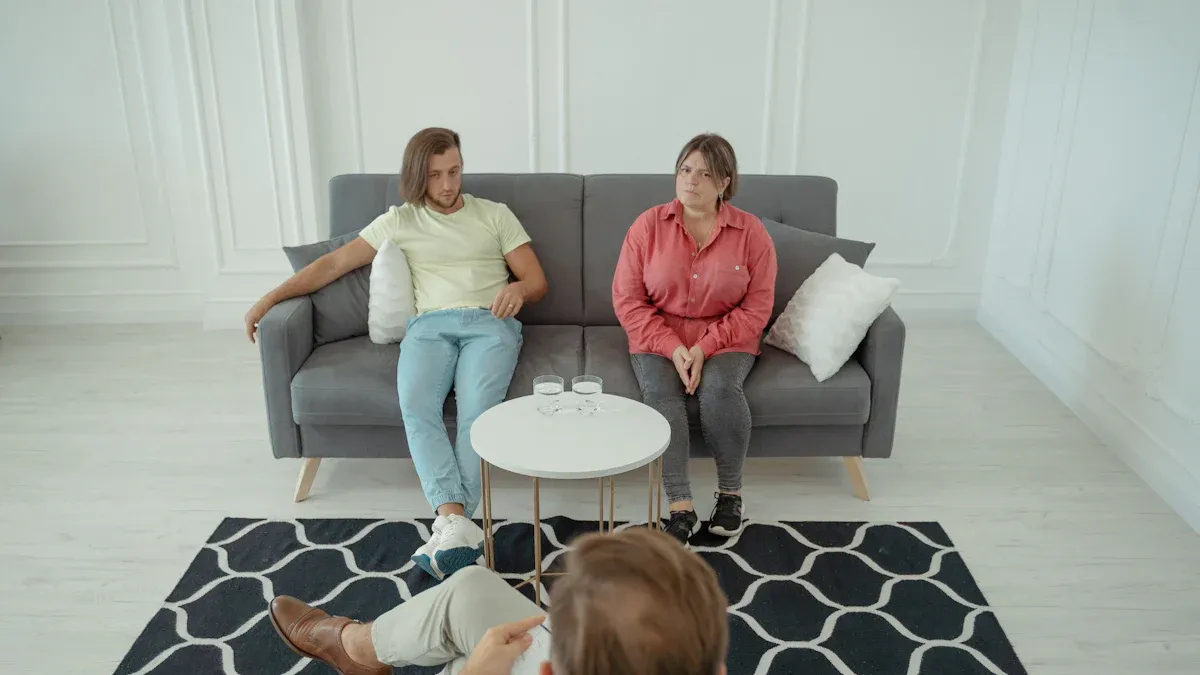


Pingback: What Is Anxious Attachment and How Does It Show Up in Relationships
Pingback: If You’re Over 25, Here’s the Relationship Advice You Should Know